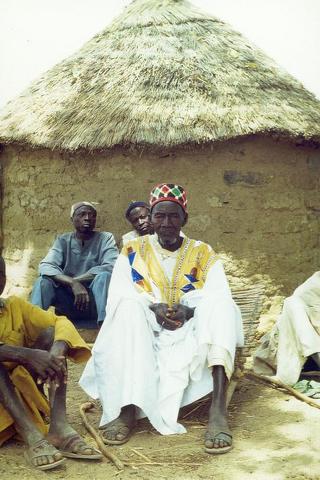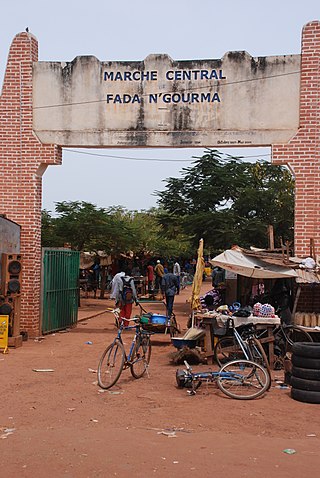
Burkina Faso's 22.1 million people belong to two major West African cultural groups: the Gur (Voltaic) and the Mandé. The Voltaic are far more numerous and include the Mossi, who make up about one-half of the population. The Mossi claim descent from warriors who migrated to present-day Burkina Faso and established an empire that lasted more than 800 years. Predominantly farmers, the Mossi are still bound by the traditions of the Mogho Naba, who hold court in Ouagadougou.
These are lists of incumbents, including heads of states or of subnational entities.

The music of Burkina Faso includes the folk music of 60 different ethnic groups. The Mossi people, centrally located around the capital, Ouagadougou, account for 40% of the population while, to the south, Gurunsi, Gurma, Dagaaba and Lobi populations, speaking Gur languages closely related to the Mossi language, extend into the coastal states. In the north and east the Fulani of the Sahel preponderate, while in the south and west the Mande languages are common; Samo, Bissa, Bobo, Senufo and Marka. Burkinabé traditional music has continued to thrive and musical output remains quite diverse. Popular music is mostly in French: Burkina Faso has yet to produce a major pan-African success.

The Mossi are a Gur ethnic group native to modern Burkina Faso, primarily the Volta River basin. The Mossi are the largest ethnic group in Burkina Faso, constituting 52% of the population, or about 11.1 million people. The other 48% of Burkina Faso's population is composed of more than 60 ethnic groups, mainly the Gurunsi, Senufo, Lobi, Bobo, Bissa and Fulani. The Mossi speak the Mòoré language.

Fada N'gourma, also written Fada-Ngourma or Noungu, is a city and an important market town in eastern Burkina Faso, lying 219 kilometres (136 mi) east of Ouagadougou, in the Gourmantché area. It is the capital of the Est Region and Gourma Province, and is also the seat of the king of the Gurma and the Roman Catholic Diocese of Fada N'Gourma.

Yatenga is one of the provinces of Burkina Faso, located in the Nord Region of the country. In modern Yatenga, the most prominent city is Ouahigouya. This city served as the capital of the kingdom of Yatenga, a powerful kingdom out of the many Mossi kingdoms, but its influence decreased in the century following French colonisation. The city is famed today for being home to the Naba's compound and the tomb of Naba Kango.

The Mossi Kingdoms, sometimes referred to as the Mossi Empire, were a group of powerful kingdoms in modern-day Burkina Faso which dominated the region of the upper Volta river for hundreds of years. The largest Mossi kingdoms was that of Ouagadougou and the king of Ouagadougou known as the Mogho Naaba, or King of All the World, serves as the Emperor of all the Mossi. The first kingdom was founded when Dagomba warriors from the region that is present-day Ghana and Mandé warriors moved into the area and intermarried with local people. Centralization of the political and military powers of the kingdoms begin in the 13th century and led to conflicts between the Mossi kingdoms and many of the other powerful states in the region. In 1896, the French took over the kingdoms and created the French Upper Volta which largely used the Mossi administrative structure for many decades in governing the colony.
Articles related to Burkina Faso include:

Upper Volta was a colony of French West Africa established in 1919 in the territory occupied by present-day Burkina Faso. It was formed from territories that had been part of the colonies of Upper Senegal and Niger and the Côte d'Ivoire. The colony was dissolved on 5 September 1932, with parts being administered by the Côte d'Ivoire, French Sudan and the Colony of Niger.